
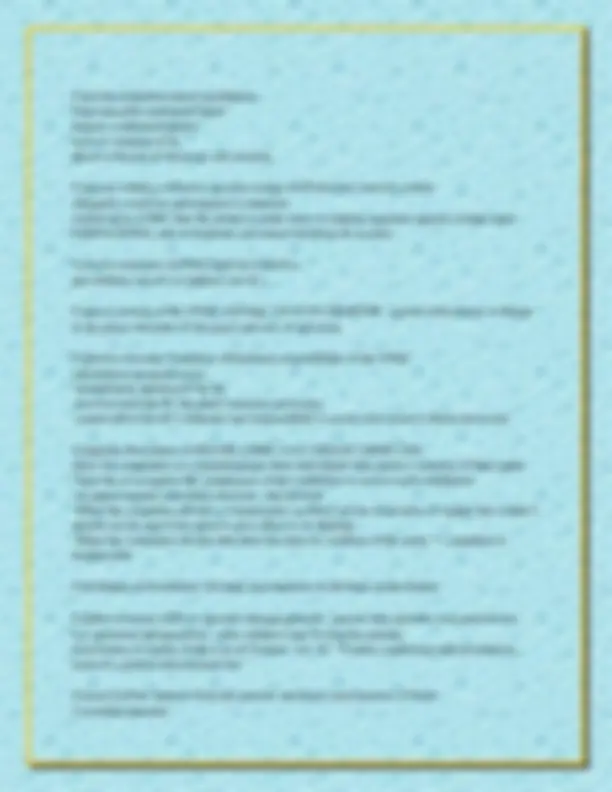
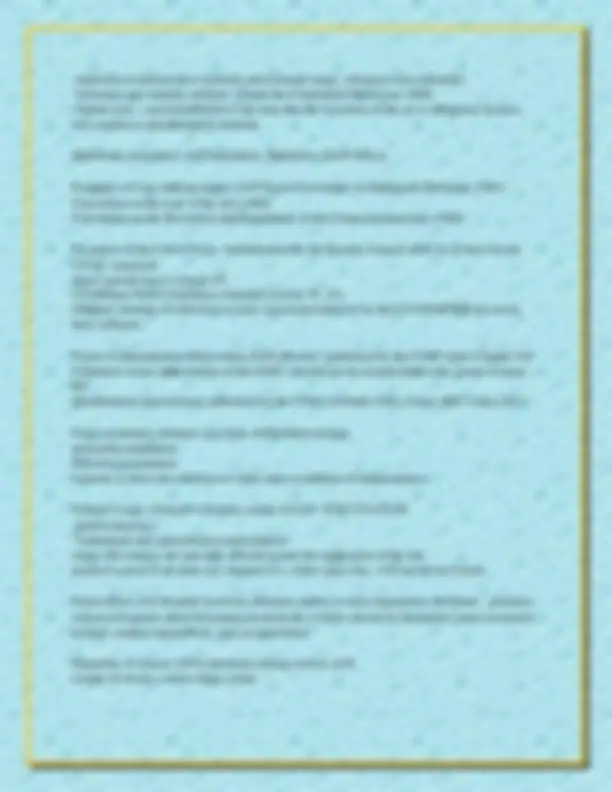
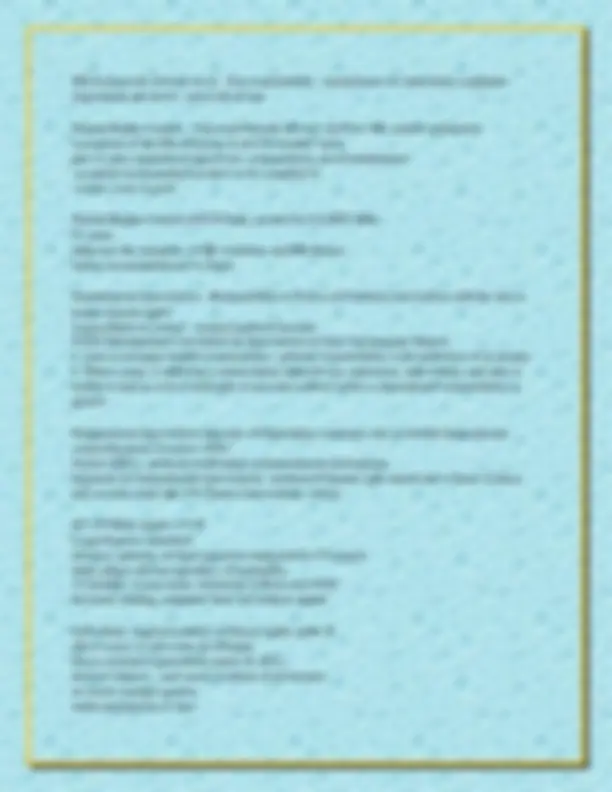
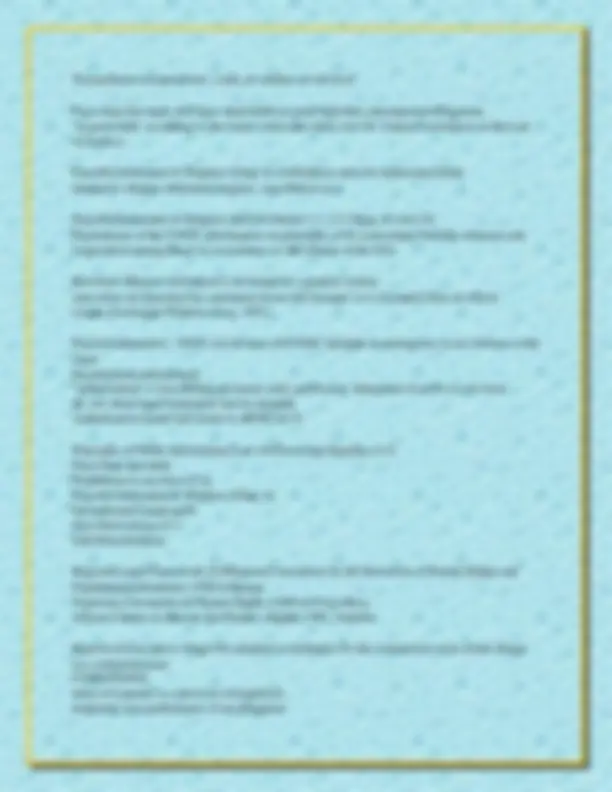
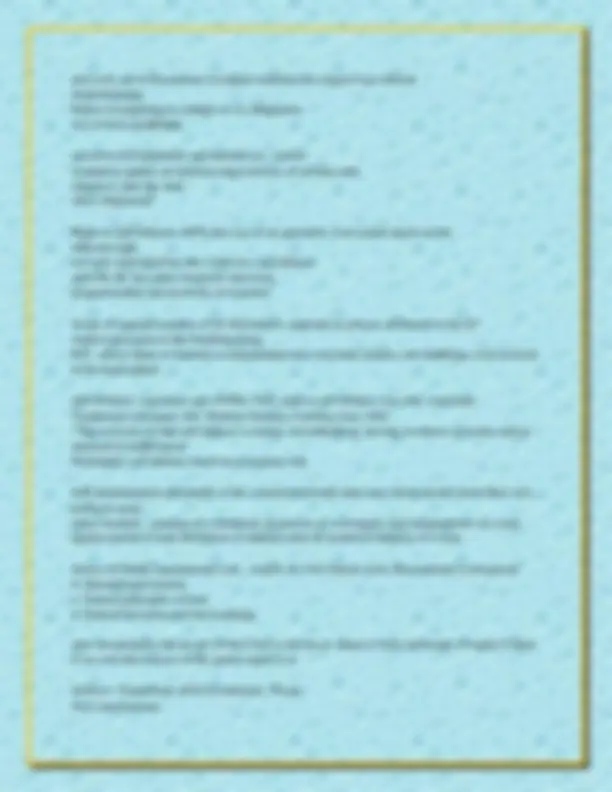
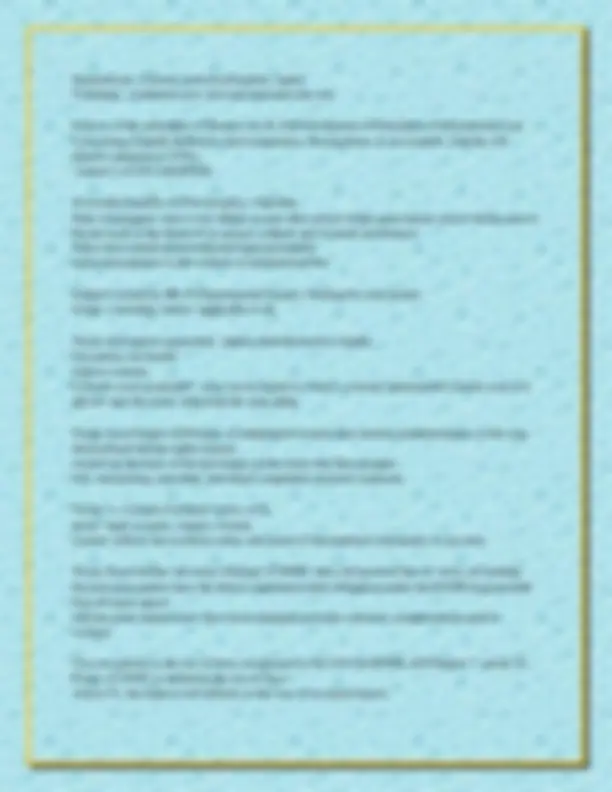


Study with the several resources on Docsity

Earn points by helping other students or get them with a premium plan


Prepare for your exams
Study with the several resources on Docsity

Earn points to download
Earn points by helping other students or get them with a premium plan
Community
Ask the community for help and clear up your study doubts
Discover the best universities in your country according to Docsity users
Free resources
Download our free guides on studying techniques, anxiety management strategies, and thesis advice from Docsity tutors
A comprehensive overview of key concepts and principles in public international law, focusing on topics such as access to remedy, armed attack, coercion, humanitarian intervention, and the hierarchy of sources. It includes definitions, examples, and relevant legal provisions, making it a valuable resource for students preparing for a final exam in this subject.
Typology: Exercises
1 / 11

This page cannot be seen from the preview
Don't miss anything!







"Failed State" ✔✔collapse of govt within a state: loss of control by central authorities failed state is not a terra nulls (Somalia 1990s)
Access to remedy - European Court of HR ✔✔jurisdiction: securing rights and freedoms defined in the ECHR to everyone within the jurisdiction of the State parties to ECHR -decisions final and binding -implementation is assured by the Committee of Ministers of the Council of Europe -full-fledged judicial court of HR (direct access of individuals, appeal, execution of judgments)
Access to remedy - Inter-American Court of HR ✔✔Judicial organ of the Organization of American States (1979) role: interpret and apply the American Convention on Human Rights (1969) and other treaties concerning this matter -safeguard the essential rights of man in the American continent Convention created: Inter-American Commission on HR and Inter-American Court of HR
Access to remedy - international level ✔✔No world court of human rights but international organs: UN system -Office of High Commissioner for Human Rights (OHCHR) offers expertise and support to the different human rights monitoring mechanisms in the UN system
Access to remedy ✔✔Domestic legal proceedings: before national courts/tribunals International procedures: individual who claim that their rights and freedoms have been violated may complain about it in international arena call the state in question to account for its actions
Adjudication ✔✔binding method of a dispute settlement
African Court on Human and People's Rights: ✔✔Jurisdiction: over all cases submitted to it with respect to the interpretation and application of the African Charter on Human and Peoples' Rights functions since 2006 Complaints submitted by : parties to the Protocol, African Intergovernmental Organizations, NGOs and individuals (from states that have made a declaration accepting the jurisdiction of the Court : 5 countries)
Arbitration ✔✔settlement of differences b/t states by judges of their choice binding for parties concerned
Armed attack ✔✔banned in Art.2/4 : specific "use of force" -force used on a large scale : significant effect (cross-border actions by regular forces, invasion, bombardment) -No official definition " general agreement" -Article 2 of the GA RES 3314 definition of agression & armed attack Wording of Article 51 "inherent" proves it is customary law
Article 2 UN CHARTER ✔✔organization and its members shall act in accordance with the following principles.
Article 2.4 UN CHARTER ✔✔Prohibition to use force and threat to use force against territorial integrity and political independence
Article 25 ✔✔member of the UN agree to accept and carry out decisions of the SC
Article 41 : Coercion not involving the use of force ✔✔UNSC can impose various coercive measures w/out the use of force
Article 41: Int Criminal Tribunals ✔✔established by UNSC : maintain/restore intl peace and security
Article 41: types of measures ✔✔limitation/interruption of diplomatic representations arms embargo general embargo
Article 41: types of measures: targeted sanctions ✔✔directed against individual responsible travel ban, assets freeze challenges: identification of the targeted person guarantee of the due process against targeting
ARTICLE 51 & Customary Law ✔✔Article 51 supersedes but pre-charter self-defense and article 51 can coexist recourse to traditional customary rule cannot widen the scope of article 51 limit to a minimum the unliteral use of force in international relations
Authorization of use of force ✔✔Use of force: strictly defined objective: time limit: control mechanism (system of reporting to the UNSC)
Belgium in Congo in 1960s ✔✔could be an exception external to the UN CHARTER : protection of citizens abroad in a state of emergency endangering their life abroad.
-repetition of practice/acts (uniform and constant usage, constance and continuity) "extensive and virtually uniform" (North Sea Continental Shelf Case 1969) -Opinio juris : conviction/belief of the state that the execution of the act is obligatory because law requires it (psychological element)
Diplomatic procedures ✔✔Negotiation, Mediation, Good Offices
Examples of Law-making treaties ✔✔Vienna Convention on Diplomatic Relations (1961) Convention on the Law of the Sea (1982) Convention on the Prevention and Punishment of the Crime and Genocide (1948)
Exception of the Use of Force: Authorization by the Security Council ✔✔Use of force by the UN SC Article 42 States provide force (Article 43) UN Military Staff Committee command (Article 45 -47) (Military element of collective security system provided for by the UN CHARTER has never been realized)
Forms of Humanitarian Intervention ✔✔Collective: authorized by the UNSC under Chapter VII Unilateral: w/out authorization of the UNSC: carried out by an individual state, group of states, RO Humanitarian interventions authorized by the UNSC (Somalia 1992, Congo 2003, Libya 2011)
Four constitutive elements of a State ✔✔Defined territory permanent population Effective government capacity to enter into relations w/ other states (condition of independence)
General Usage : General customary norms ✔✔Art. 38 ICJ STATUTE "general practice" "widespread and representative participation" states who interest are specially affected ensure the application of the law postitive action of all states not required (i.e.: Outer space law : US and Soviet Union)
Good offices ✔✔3rd party involved, influence parties to enter negotiation, facilitator : promotes contacts b/t parties w/out becoming involved, he is freely chosen by the parties (meet on neutral ground, conduct negotiations, sign an agreement)
Hierarchy of sources ✔✔no hierarchy among sources of IL custom no lesser a source than a treaty
HR Framework ✔✔state level - first responsibility : mechanisms for individual complaints (regional & intl level) - need rule of law
Human Rights Council - Universal Periodic Review ✔✔New HR control mechanism assessment of the HR situations in all UN member states peer-to-peer mechanism (questions, commentaires, recommendations) -accepted recommendations have to be complied w/ -review every 4 years
Human Rights Council ✔✔UN body, created by GA RES 2006 47 states addresses the situations of HR violations and HR themes makes recommendations to States
Humanitarian Intervention - Responsibility to Protect ✔✔military intervention with the aim to protect human rights responsibility to protect : modern political doctrine ICISS (International Convention on Intervention on State Sovereignty) Report: a. state sovereignty implies responsibility : primary responsibility is the protection of its people. b. Where a pop. is suffering a serious harm (internal war, repression, state failure) and state is unable to halt or avert it, principle of non-intervention yields to international responsibility to protect.
Humanitarian Intervention Doctrine ✔✔Emerging customary rule of forcible humanitarian countermeasures (Cassese 1999) Joyner (2007) : political justification of humanitarian intervention argument for humanitarian intervention: violation of human right turned into a threat of peace and security under the UN Charter (intervention: Libya)
ICJ ✔✔Main organs of UN Legal disputes submitted advisory opinions on legal questions requested by UN organs indpt judges elected regardless of nationality 15 member: 9 year terms, elected by UNGA and UNSC decisions binding, judgment final and without appeal
Individuals: legal personality ✔✔direct rights under IL direct access to intl courts & tribunals direct criminal responsibility under IL (ICC) derived subjects : can't assert violation of intl treaties no norm creating capacity under jurisdiction of state
International organizations ✔✔founded on an intl agreement creating a new legal person IO : secondary subject that derive from states will functional nature: do not achieve complete nature of states
International recognition of a state ✔✔recognition of a state : method of accepting certain factual situation and endowing with legal significance significant intl recognition can balance objective demonstration of adherence to criteria of statehood balance lack of effective control (Kosovo 2008) minimal recognition cannot deny the statehood
Judicial Organs ✔✔ICJ, Itl tribunal for the Law of the Sea, regional courts : Court of Justice of the EU ect.
Limitations to right to self-defense ✔✔has to be immediately reported individual self-defense has to cease when collective self defense starts Security Council authority prevails
Mediation ✔✔active participation of 3rd party mediator receives a specific mandate from the parties in a conflict mediatiors w/ considerable experience & assistance of experts main actors in mediation: UN, regional organizations, great powers (USA), NGOs
Negotiation ✔✔negotiation: discussion b/t parties to reconcile/understand positions
Objectives of the SC's authorization of use of force ✔✔-assure delivery of humanitarian assistance (Somalia 1992) -assure implementation of naval embargo (Haiti 1993) -maintain the cease-fire/peace treaty (Liberia 2003) -protect civilians, security zones (Libya 2011) -keep secure environments for the functioning of the state (Afghanistan 2003) -Protect a PKO (East Timor 1999) -Fight against piracy and armed robbery at sea (Somalia 2008)
Other source of Human Rights Law ✔✔-International Convention on the Elimination of All Forms of Racial Discrimination (1965) ect.
Other subjects of IL ✔✔Intl Committee of Red Cross: NGO : capacity to enter into IL agreements Vatican Intl public companies
Transnational coroporations: codes of conduct on intl level
Pacta Sunt Servanda ✔✔states shall fulfill in good faith their international obligations "in good faith" according to the treaty's letter and spirit (Art 26. Vienna Convention on the Law of treaties)
Peaceful Settlement of Disputes (Chap. 6) ✔✔disputes must be settled peacefully alternative dispute settlement (inquiry, conciliation ect.)
Peaceful Settlement of Disputes ✔✔UN Charter 1.1, 2.3, Chap. VI (Art.33) Declarations of the UNGA (Declaration on principles of IL Concerning Friendly relations and cooperation among States in Accordance w/ the Charter of the UN)
Persistent Objector ✔✔refusal to be bound by a general custom state raises an objection but customary norm still emerges: it is exempted from its effects (Anglo-Norwegian Fisheries Case, 1951)
Practical alternative : UNSC use of force ✔✔UNSC delegate its prerogative to use of force to the states decentralized enforcement "authorization" = non binding decisions: only permission: delegation of power to use force SC sets fixed legal framework and its mandate Authorization model laid down in ARTICLE 53
Principles of Public International Law ✔✔Sovereign Equality (2.1) Pacta Sunt Servanda Prohibition to use force (2.4) Peaceful Settlement of Disputes (Chap. 6) International Cooperation Non-intervention (2.7) Self-Determination
Regional Legal Framework ✔✔Eurpean Convention for the Protection of Human Rights and Fundamental Freedoms (1950 in Rome) American Convention on Human Rights (1969 in Costa Rica) African Charter on Human and People's Rights (1981, Nairobi)
Reprisal ✔✔act that is illegal but adopted in retaliation for the commission of an earlier illegal act: countermeasure CONDITIONS: taken in response to a previous wrongful act temporary non performance of an obligation
Spontaneous: Custom, general principles, equity Voluntary : Unilateral acts, non conventional joint acts
Sources of the principles of Respect for IL ✔✔-Declaration of Principles of International Law Concerning Friendly Relations and Cooperation Among States in Accordance with the UN Charter (adopted in 1970) -Article 2 of UN CHARTER
Sovereign Equality ✔✔Sovereignty + Equality State sovereignty: state is not subject to any other power of the same nature: power of the state to decide itself of the limits of its powers without any external interference States have identical international legal personality equal participation in the creation of international law
Subjects bound by HR ✔✔International treaties: binding for state parties norms: customary nature: applicable to all
Treaty ✔✔express agreement : parties bind themselves legally non parties not bound express consent Customs exist in parallel : state can be bound to respect a certain international custom even if it did not sign the treaty reflecting the same thing.
Treaty based bodies ✔✔bodies of independent experts that monitor implementation of the core international human rights treaties created on the basis of the provisions of the treaty that they monitor role: monitoring, reporting, individual complaints, general comments
Treaty vs. Custom ✔✔equal source of IL treaty: legal security, express consent custom: reflects the essential values and needs of international community at any time
Treaty-based bodies' decisions binding? ✔✔HRC takes the position that its views are binding because state parties have the duty to implement their obligation under the ICCPR in good faith (not all states agree) still has great impact (laws have been changed, prisoners released, compensations paid to victims)
Two exceptions to the use of force recognized by the UN CHARTER ✔✔Chapter 7, article 42 : Power of UNSC to authorize the use of force Article 51: the right to self-defense in the case of an armed attack.
Two techniques of Conflict Management ✔✔diplomatic procedures: attempt to resolve the disputes by the parties themselves/with aid of a 3rd party Adjudication: binding method of a dispute settlement Principle of free choice of means
UN International Bill of Rights ✔✔Universal Declaration of Human Rights (1948) - Fundamental, comprehensive, non-binding.
Universal Legal Framework (UN) ✔✔UN Charter: first HR terminology: general provisions (Art. 1 & 2) Universal Declaration of Human Rights (1948): fundamental HR document, source of inspiration of other HR documents, non-binding
UNSC Composition (Art.23) ✔✔5 permanent members 10 non permanent members term of 2 years, elected from regional groups (Africa, Asia, LA, Western Europe, Eastern Europe (1 seat)
UNSC decision-making (Art.27) ✔✔each member :1 vote decisions on procedural matters : vote of 9 members on other matters: 9 members and votes of permanent member veto: unanimity required "minority veto" : 7 non-permanent members
Where do we find human rights ✔✔international treaties & customary law; international human rights law lays down obligations